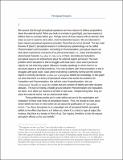Files in this item
Perceptual reasons
Item metadata
| dc.contributor.author | Comesana, Juan | |
| dc.contributor.author | McGrath, Matthew | |
| dc.date.accessioned | 2016-08-23T23:33:30Z | |
| dc.date.available | 2016-08-23T23:33:30Z | |
| dc.date.issued | 2016-04 | |
| dc.identifier | 215729009 | |
| dc.identifier | 562699a8-68be-470b-b872-583820f67033 | |
| dc.identifier | 84961187521 | |
| dc.identifier.citation | Comesana , J & McGrath , M 2016 , ' Perceptual reasons ' , Philosophical Studies , vol. 173 , no. 4 , pp. 991-1006 . https://doi.org/10.1007/s11098-015-0542-x | en |
| dc.identifier.issn | 0031-8116 | |
| dc.identifier.uri | https://hdl.handle.net/10023/9365 | |
| dc.description.abstract | The two main theories of perceptual reasons in contemporary epistemology can be called Phenomenalism and Factualism. According to Phenomenalism, perceptual reasons are facts about experiences conceived of as phenomenal states, i.e., states individuated by phenomenal character, by what it’s like to be in them. According to Factualism, perceptual reasons are instead facts about the external objects perceived. The main problem with Factualism is that it struggles with bad cases: cases where perceived objects are not what they appear (illusions, broadly speaking) or where there is no perceived object at all (hallucinations). The main problem with Phenomenalism is that it struggles with good cases: cases where everything is perfectly normal and the external object is correctly perceived, so that one’s perceptual beliefs are knowledge. In this paper we show that there is a theory of perceptual reasons that avoids the problems for Factualism and Phenomenalism. We call this view Propositionalism. We use ‘proposition’ broadly to mean the entities that are contents of beliefs and other doxastic attitudes. The key to finding a middle ground between Phenomenalism and Factualism, we claim, is to allow our reasons to be false in bad cases. Despite being false, they are about the external world, not our phenomenal states. | |
| dc.format.extent | 16 | |
| dc.format.extent | 268025 | |
| dc.language.iso | eng | |
| dc.relation.ispartof | Philosophical Studies | en |
| dc.subject | Perceptual reasons | en |
| dc.subject | Phenomenalism | en |
| dc.subject | Factualism | en |
| dc.subject | Propositionalism | en |
| dc.subject | B Philosophy (General) | en |
| dc.subject.lcc | B1 | en |
| dc.title | Perceptual reasons | en |
| dc.type | Journal article | en |
| dc.contributor.institution | University of St Andrews. School of Philosophical, Anthropological and Film Studies | en |
| dc.contributor.institution | University of St Andrews. Philosophy | en |
| dc.identifier.doi | https://doi.org/10.1007/s11098-015-0542-x | |
| dc.description.status | Peer reviewed | en |
| dc.date.embargoedUntil | 2016-08-23 |
This item appears in the following Collection(s)
Items in the St Andrews Research Repository are protected by copyright, with all rights reserved, unless otherwise indicated.

